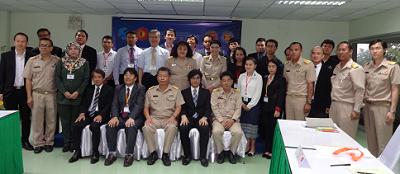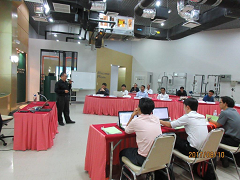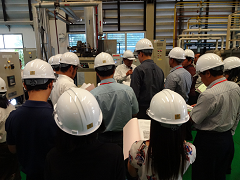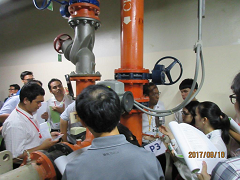Implementation of practical training for leader capacity building of qualified energy managers at the training center in Thailand
Under the instruction and financial support of the Ministry of Economy, Trade and Industry (METI) for the project (EE&C capacity building program) contributive to promotion, etc. of energy conservation measures and introduction of renewable energy in the developing countries, etc., the Energy Conservation Center, Japan (ECCJ) implemented practical training for leader capacity building of the qualified energy manager capacity building program in the AJEEP (ASEAN JAPAN Energy Efficiency Partnership) Scheme 2 at the Training Center in Thailand during the five days between August 7 and 11, 2017.
(1) Simulations, data collection and analysis using the mini plant and Demonstration Center facilities.
(2) Participation by a total of 16 trainees from the ASEAN member states and from the ACE.
(3) Sharing of the current situations of the qualified energy manager certification systems in the member states, and formulation of energy conservation audit plans for each state.

Overall group photograph

Lecture

Training at the mini plant

Training at the Demonstration Center
As the qualified energy manager capacity building program in the AJEEP Scheme 2, ECCJ used the Training Center facilities in Thailand (Mini plant and Demonstration Center) to implement practical training.(1) Using the Training Center facilities, ECCJ implemented practical training in the order of simulations, data collection by actually operating the facilities, and data analysis.
(2) The current fiscal year is the second year of Scheme 2, and more participants were invited than in the previous fiscal year (nine ASEAN member states (Singapore did not participate) in addition to the ACE) to the training so as to foster ASEAN leaders.
(3) Information was shared including the actual situations and problems in the qualified energy manager systems in the ASEAN member states, and energy conservation audit plans were formulated as the practical training in each state in the second action of this project.
(4) Making best use of the experiences obtained this time, energy conservation audits will be conducted in the member states, and the reporting of the results and final examinations will be included in the acceptance activities in Japan. By comprehensively evaluating the results, the participants will be certified as ASEAN leaders.

